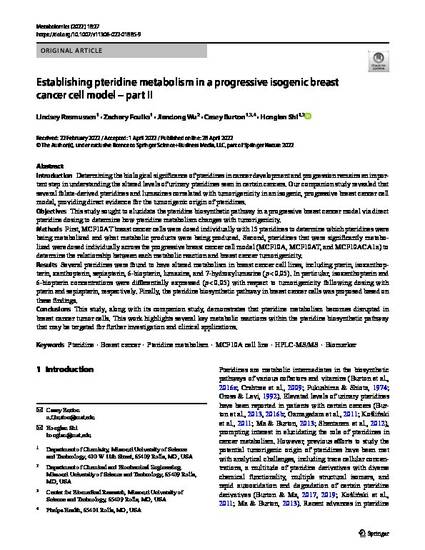
Introduction: Determining the biological significance of pteridines in cancer development and progression remains an important step in understanding the altered levels of urinary pteridines seen in certain cancers. Our companion study revealed that several folate-derived pteridines and lumazines correlated with tumorigenicity in an isogenic, progressive breast cancer cell model, providing direct evidence for the tumorigenic origin of pteridines. Objectives: This study sought to elucidate the pteridine biosynthetic pathway in a progressive breast cancer model via direct pteridine dosing to determine how pteridine metabolism changes with tumorigenicity. Methods: First, MCF10AT breast cancer cells were dosed individually with 15 pteridines to determine which pteridines were being metabolized and what metabolic products were being produced. Second, pteridines that were significantly metabolized were dosed individually across the progressive breast cancer cell model (MCF10A, MCF10AT, and MCF10ACA1a) to determine the relationship between each metabolic reaction and breast cancer tumorigenicity. Results: Several pteridines were found to have altered metabolism in breast cancer cell lines, including pterin, isoxanthopterin, xanthopterin, sepiapterin, 6-biopterin, lumazine, and 7-hydroxylumazine (p < 0.05). In particular, isoxanthopterin and 6-biopterin concentrations were differentially expressed (p < 0.05) with respect to tumorigenicity following dosing with pterin and sepiapterin, respectively. Finally, the pteridine biosynthetic pathway in breast cancer cells was proposed based on these findings. Conclusions: This study, along with its companion study, demonstrates that pteridine metabolism becomes disrupted in breast cancer tumor cells. This work highlights several key metabolic reactions within the pteridine biosynthetic pathway that may be targeted for further investigation and clinical applications.
- Biomarker,
- Breast cancer,
- HPLC-MS/MS,
- MCF10A cell line,
- Pteridine,
- Pteridine metabolism
Available at: http://works.bepress.com/honglan-shi/107/

National Institutes of Health, Grant R03CA219337